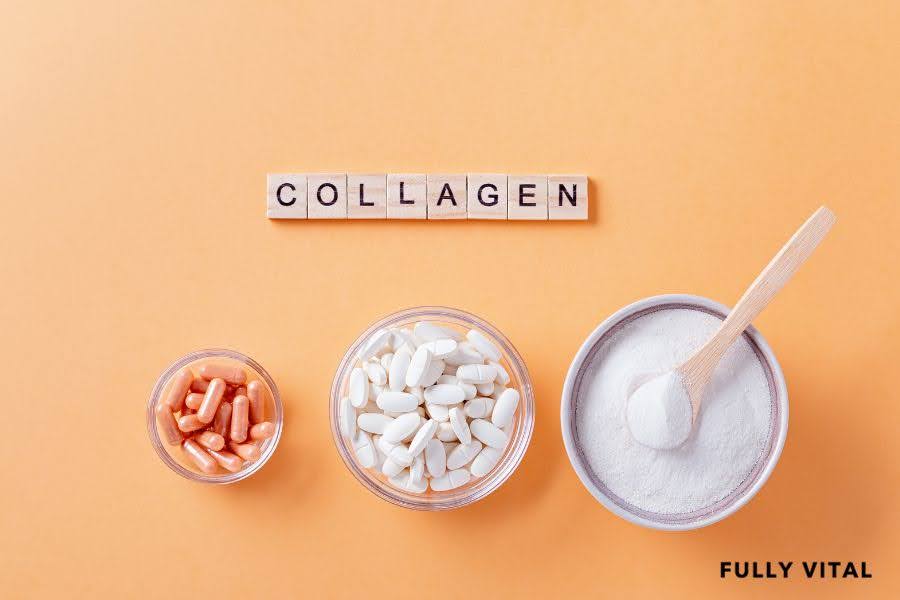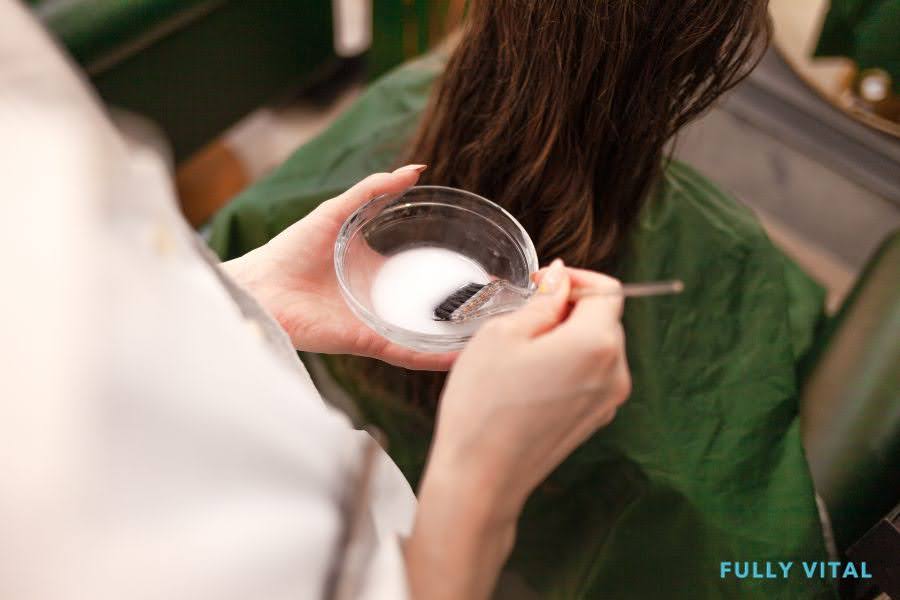
Vitamin A: Gateway to Vibrant Hair Growth
Why is discussing Vitamin A important?
This question is pertinent given Vitamin A's critical role in maintaining vision, immune function, and overall health.
The human body requires an array of vitamins to function optimally, and Vitamin A stands out as a vital nutrient with wide-reaching benefits, including the maintenance of healthy skin and hair.
Keep your tresses thriving with a balanced diet, and consider FullyVital's range for targeted hair growth support, harnessing the power of nature.

I LOVE MY HAIR NOW
FullyVital hair serum and hair vitamins made tremendous improvements in my hair. I truly love my hair now.
Shop Hair ProductsWhat Exactly Is Vitamin A?
Vitamin A isn't just a single compound but rather a group of fat-soluble retinoids, including retinol, retinal, and retinyl esters.
It's found in two primary forms in the human diet: preformed Vitamin A and provitamin A carotenoids.
Preformed Vitamin A is obtained from animal products such as fish, meat, and dairy, while provitamin A is found in plant-based foods like fruits, vegetables, and other plant-derived products—carrots, sweet potatoes, and kale being notable examples.
The body needs Vitamin A for various physiological functions.
It helps in the formation and maintenance of healthy teeth, skeletal and soft tissue, mucus membranes, and skin.
It's also renowned for its role in facilitating good vision, particularly in low light.
Moreover, it's crucial for reproduction and breastfeeding.
How Does Vitamin A Benefit Your Health?
What Are The Known Health Benefits Of Vitamin A?
This vitamin is quintessential for not only keeping the eyes in shipshape but also for bolstering the immune system.
Its immunomodulatory effects are far-reaching, shielding the body from infections by helping to maintain the integrity of the mucosal surfaces in the eyes, respiratory tract, urination, and intestinal areas.
Vitamin A is a critical player in cellular communication and plays a role in cell growth and differentiation, impacting various cell processes.
For your skin, which is the body's largest barrier against the environment, Vitamin A is key.
It helps reduce the breakdown of your skin's protective functions and collaborates in repairing the body's tissues.
Not to mention its potential role in reducing the risk of certain cancers, although research is ongoing in this area.
How Does Vitamin A Contribute To Hair Wellness?
Interestingly, Vitamin A aids in producing an oily substance known as sebum.
Sebum moisturizes the scalp and keeps hair healthy.
Deficiencies in this vitamin may lead to several problems, including hair loss.
Although more research is needed, obtaining sufficient Vitamin A—either through diet or in some cases supplements—may promote hair growth and contribute to fuller, more vibrant hair when part of a well-rounded nutritional approach.
What Is The Recommended Daily Intake For Vitamin A?
What Is The Rda For Vitamin A Across Different Age Groups?
The Recommended Dietary Allowance (RDA) for Vitamin A varies by age, sex, and life stage.
For instance, adult men require about 900 micrograms (mcg) of Vitamin A per day, while adult women should aim for 700 mcg.
Pregnant and breastfeeding women have higher needs, typically around 770 to 1300 mcg daily, to support fetal growth and milk production.
How Can One Ensure They Meet Their Daily Vitamin A Intake?
A diverse diet that includes a mix of foods rich in preformed Vitamin A (such as liver, fish, and dairy products) and provitamin A (like leafy greens, orange and yellow vegetables, and tomatoes) can help most individuals meet their daily requirements for good health.
For those unable to attain sufficient Vitamin A through diet alone, supplements might be considered, a topic we'll address further later in this piece.
What Happens When You Have Too Little Or Too Much Vitamin A?
What Are The Signs Of Vitamin A Deficiency?
Having insufficient Vitamin A can lead to several health issues.
The most notable is night blindness, a condition that impedes vision in low light or darkness.
Other signs of a deficit can include an increased susceptibility to infections, dry skin, and eye issues such as xerophthalmia, which can lead to blindness in severe cases.
Children in developing countries are particularly vulnerable to the impacts of Vitamin A deficiency, which can hamper growth and even raise the risk of mortality from serious infections like measles.
What Are The Risks Of Vitamin A Toxicity?
On the flip side, an excess of Vitamin A, known as hypervitaminosis A, can be toxic and cause an array of symptoms, ranging from headache, nausea, and dizziness to more serious effects like hair loss, liver damage, and even neurological problems.
Toxicity is usually associated with overconsumption of supplements rather than food sources.
Pregnant women need to be cautious, as high levels of Vitamin A can cause birth defects.
Why Is Vitamin A Important For Hair Health?
What Role Does Vitamin A Play In Maintaining Healthy Hair?
Proper levels of Vitamin A are associated with good hair health due to its involvement in the production of sebum.
Sebum moisturizes the scalp and acts as a natural conditioner for your hair.
This not only prevents dryness but can also reduce the likelihood of a flaky scalp.
Additionally, Vitamin A is necessary for the growth and maintenance of all cells, including hair follicles, the tiny pores from which new hairs grow.
How Can Vitamin A Be Included In A Hair Care Routine Without Product Placement?
Incorporating Vitamin A into a hair care routine is primarily about dietary choices.
Consuming a balanced diet with a variety of Vitamin A-rich foods ensures your hair gets the nutrients it needs.
This could mean including more leafy greens, orange and yellow vegetables, and animal-derived foods like dairy and fish in your meals.
For individuals with dietary restrictions that limit these food sources, a holistic approach may involve supplements, on advisement from a healthcare professional.

Which Foods Are Rich In Vitamin A?
What Are Some Vitamin A-Rich Foods To Include In Your Diet?
If you're looking to bump up your Vitamin A intake naturally, there's a variety of foods to consider.
Animal-based sources like liver and fish oils are the most potent, while dairy products like milk, butter, and cheese offer moderate amounts.
Plant-based foods offer provitamin A, primarily in the form of beta-carotene, which your body can convert to Vitamin A.
Brightly colored fruits and vegetables like carrots, sweet potatoes, spinach, and red bell peppers are not only delicious but also packed with this essential nutrient.

When Should You Consider Vitamin A Supplements?
Under What Circumstances Are Vitamin A Supplements Recommended?
While the preferred path to getting an adequate amount of this vitamin is through a balanced diet, there are scenarios where supplements may be necessary.
Individuals with conditions that impair the absorption of nutrients, those with restrictive diets that limit the intake of Vitamin A-rich foods, and pregnant women advised by their doctor could benefit from supplementation.
What Should Be Considered Before Taking Vitamin A Supplements?
It's imperative to act with caution when it comes to supplements.
The risks associated with excess intake mean that self-prescribing high doses could lead to toxicity.
Furthermore, certain forms of Vitamin A supplements are better absorbed and utilized by the body than others.
For instance, preformed Vitamin A (retinol or retinyl esters) is readily available for the body's use, making it more effective but also bearing a higher potential for toxicity if not managed carefully.
Are There Any Interactions And Side Effects With Vitamin A?
What Potential Interactions Exist With Vitamin A Supplementation?
Vitamin A can interact with several types of medications, including some used to treat acne, like isotretinoin, which is already a form of Vitamin A.
It can also interact with blood thinners, cancer treatments, and cholesterol-lowering drugs.
These interactions can either amplify the side effects or reduce the effectiveness of the medications.
What Side Effects Might Occur With Vitamin A Intake?
Apart from the signs of toxicity mentioned earlier, other side effects from high doses of Vitamin A supplements can include joint pain, bone weakness, and liver issues.
It's uncommon for these symptoms to arise from dietary sources, but overuse of supplements without professional supervision can lead to these adverse outcomes.
Discover the Power Of Fully Vital Hair Growth ProductsAt Fully Vital, we strive to offer the best hair growth products that are scientifically formulated to stop and reverse the aging of your hair. Our range of products comes with a variety of features and benefits to help you achieve your hair growth goals. Key Features:
Benefits:
Ready to transform your hair? Check out our range of Fully Vital hair growth products and rediscover the joy of healthy, vibrant hair. |
Final Thoughts On Vitamin A
the importance of Vitamin A in maintaining overall health, including vision, immune function, and even hair wellness, cannot be overstated.
This fat-soluble vitamin plays a crucial role in various physiological functions, from maintaining healthy teeth and skin to supporting cellular communication and growth.
Ensuring that you meet your daily Vitamin A intake through a balanced diet rich in both preformed and provitamin A sources is the most recommended approach.
However, there are situations where supplementation may be necessary, such as for individuals with absorption issues or restrictive diets, under the guidance of a healthcare professional.
Nourish your hair with the right nutrients like Vitamin A, and let FullyVital's hair growth collection be a part of your comprehensive care strategy.
Check out our recent blogs:
- Protein Overload: Causes, Symptoms, And Solutions For Hair
- Relaxer Hair Dos And Don'ts: Essential Care And Maintenance
- Chic Trends: Embrace Elegance With Grey Highlights
Frequently Asked Questions About Vitamin A
Why is it important to understand Vitamin A?
Vitamin A is essential for vision, immune function, skin health, and hair wellness.1
What types of Vitamin A are there, and where can I find them?
There are two main types: preformed Vitamin A (animal products like fish, meat, and dairy) and provitamin A carotenoids (plant-based foods like fruits and vegetables).2
How does Vitamin A benefit overall health?
Vitamin A is vital for eye health, immune system support, skin maintenance, and cellular growth and differentiation.3
Can Vitamin A improve hair health?
Yes, it helps in the production of sebum, which conditions the scalp and promotes healthy hair.4
What is the recommended intake of Vitamin A?
For adult men, it's 900 mcg/day, and for adult women, 700 mcg/day.
Pregnant and breastfeeding women have higher needs.5
What are the consequences of not getting enough Vitamin A?
Deficiency can lead to night blindness, increased infection risk, and in severe cases, total blindness.6
Are there risks associated with consuming too much Vitamin A?
Yes, overconsumption, especially from supplements, can lead to toxicity with symptoms ranging from headaches to liver damage.7
What foods are rich in Vitamin A?
Liver, dairy, leafy greens, orange and yellow vegetables, and tomatoes are great sources.8
Should I consider taking Vitamin A supplements?
Supplements are typically for individuals with specific dietary needs or restrictions and should be taken under medical supervision.9
Could Vitamin A interact with medications or have side effects?
Vitamin A can interact with certain medications and can have side effects like joint pain and liver issues when taken in excess.10
Sources:
- Mayo Clinic. (No Date). Vitamin A. Retrieved from https://www.mayoclinic.org/drugs-supplements-vitamin-a/art-20365945.
- Cleveland Clinic. (No Date). 6 Top Benefits of Vitamin A. Retrieved from https://health.clevelandclinic.org/vitamin-a.
- National Center for Biotechnology Information. McEldrew, E. P., Lopez, M. J., & Milstein, H. (2023). Vitamin A. Retrieved from https://www.ncbi.nlm.nih.gov/books/NBK482362.
- ODS - Office of Dietary Supplements - NIH. (2023). Vitamin A and Carotenoids - Health Professional Fact Sheet. Retrieved from https://ods.od.nih.gov/factsheets/VitaminA-HealthProfessional.
- MDPI. (2022). Global Burden of Vitamin A Deficiency in 204 Countries and Territories from 1990–2019. Nutrients, 14(5), 950. Retrieved from https://www.mdpi.com/2072-6643/14/5/950.
- Harvard T.H. Chan School of Public Health. (No Date). Vitamin A. Retrieved from https://www.hsph.harvard.edu/nutritionsource/vitamin-a.
- WebMD. (No Date). The Benefits and Risks of Taking Vitamin A. Retrieved from https://www.webmd.com/diet/what-to-know-about-vitamin-a.
- Insider. (No Date). Vitamin a Toxicity: Symptoms, Causes, and Treatments. Retrieved from https://www.insider.com/guides/health/diet-nutrition/vitamin-a-toxicity.
- DermNet NZ. (No Date). Vitamin A toxicity. Retrieved from https://dermnetnz.org/topics/vitamin-a-toxicity.
- Verywell Health. (No Date). Vitamin A: Everything You Need To Know. Retrieved from https://www.verywellhealth.com/vitamin-a-everything-you-need-to-know-7498220.








